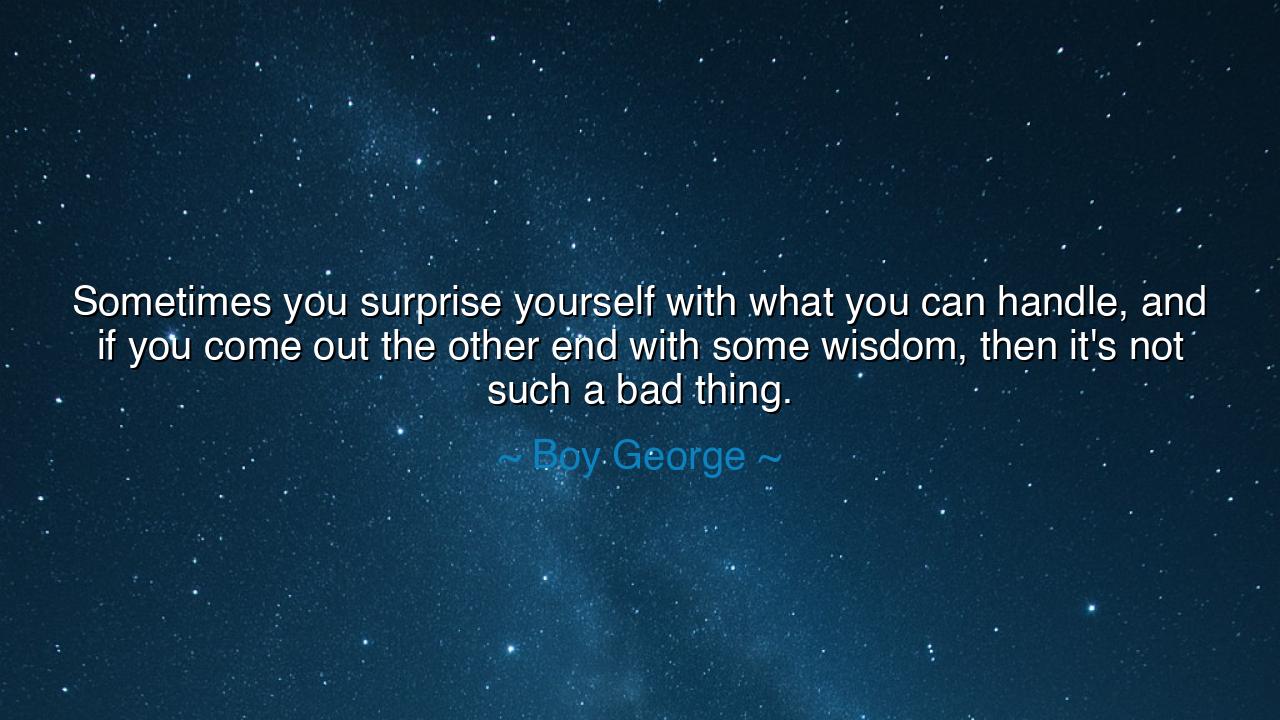
Sometimes you surprise yourself with what you can handle, and if
Sometimes you surprise yourself with what you can handle, and if you come out the other end with some wisdom, then it's not such a bad thing.






Boy George, singer of soul and bearer of many storms, spoke with the voice of one who has endured when he said: “Sometimes you surprise yourself with what you can handle, and if you come out the other end with some wisdom, then it's not such a bad thing.” In these words he honors the hidden strength of the human spirit, a strength often unseen until trial calls it forth. We do not know what burdens we can bear until fate lays them upon us; and when we endure, we discover not only resilience, but also wisdom that could not have been won in gentler days.
To be tested is to be revealed. A man may believe himself fragile, yet in the hour of sorrow or struggle, he finds a hidden wellspring within. This is the surprise of which Boy George speaks: that adversity, though bitter, awakens a strength unknown. And when the ordeal is passed, though scars may remain, the survivor carries something precious—wisdom born of experience, the knowledge that pain is not the end, but a teacher.
History gives us noble witnesses. Consider Nelson Mandela, who spent twenty-seven years in prison, not knowing how long his suffering would last. Few men could imagine surviving such a burden. Yet he endured, and in the end he surprised not only himself but the world. He emerged not with bitterness, but with wisdom—the wisdom of reconciliation, patience, and forgiveness. His trial became the furnace that revealed both his strength and his greatness.
So too, in the ancient world, the story of Job stands as a testament. Stripped of wealth, family, and health, he endured suffering that seemed beyond human measure. Yet he bore it, and though broken, he came forth with deeper understanding of life’s mystery and God’s sovereignty. His endurance gave him not only restoration, but wisdom that has inspired countless generations.
O children of tomorrow, hear this truth: life will test you with burdens you never wished to carry. You will doubt, you will fear, but often you will find yourself stronger than you dreamed. And if, at the journey’s end, you carry not only scars but also wisdom, then your suffering has not been in vain. For wisdom won through trial is a jewel more precious than gold, and those who endure become both survivors and teachers for those who follow.






MLMen Le
This quote sparks curiosity about the relationship between difficulty and personal development. Is it the intensity of the challenge or the reflection afterward that truly leads to wisdom? I also wonder whether some experiences are more transformative than others, or if even small struggles can reveal hidden resilience. How can individuals actively cultivate the ability to extract lessons and insight from adversity, rather than just enduring and moving on without deeper understanding?
HNhai nhai
I feel encouraged reading this, as it normalizes the struggle and frames it as a path to wisdom. However, it also makes me think about the societal pressure to appear in control. Do we sometimes hide our struggles from others, missing opportunities to gain insight from shared experiences? How can communities create spaces where people feel safe to confront challenges and reflect on them, thus turning hardship into collective growth and learning?
HAhoang anh
This perspective feels comforting but also prompts self-reflection. It implies that surprise at our own resilience is common, yet it raises the question of how often we fail to recognize our capacity to handle difficulties before they arise. Can anticipating challenges and preparing mentally enhance our ability to surprise ourselves positively, or does the true test of strength always come unexpectedly? I’d love a deeper perspective on how preparation intersects with lived experience.
VBNguyen Van B
Reading this evokes a sense of hope and validation. It suggests that even in the toughest moments, there is potential for learning and self-discovery. I wonder, though, how we distinguish between mere endurance and genuine growth. Are there practical ways to ensure that the lessons we gain from hardships translate into meaningful wisdom rather than just temporary coping mechanisms? It feels like a reminder to pay attention to both survival and insight.
PADo Phuong Anh
This quote resonates deeply with me because it frames challenges as opportunities for growth rather than just hardships. It makes me wonder how often people underestimate their own resilience until faced with extreme situations. Could reflecting on past struggles help us recognize our strength earlier? Also, I’m curious whether gaining wisdom from difficult experiences requires intentional reflection, or if it naturally emerges as we process and move forward.